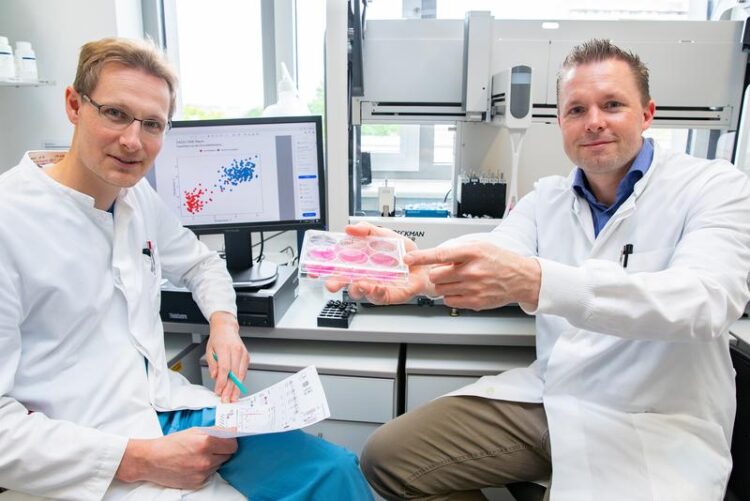New test to make gene therapy safer

Dr. Michael Rothe (right, with a cell culture cultivation dish) and Dr. Dr. Adrian Schwarzer in front of a pipetting robot for testing gene therapy vectors.
Copyright: Karin Kaiser / MHH
SAGA detects tumour potential of viral vectors for blood stem cells.
When the causes of serious diseases are based on a defective gene, medicine relies on gene therapy. In this strategy, defect-free genes are introduced into the body with the help of certain viruses. In this way, individual forms of congenital blindness, hereditary muscular atrophy or certain diseases of the blood and immune system can already be treated today. However, the viral vectors used as gene shuttles work in different ways.
Some simply deliver the intact gene into the cell. The others belong to the retroviruses and incorporate the functional copy firmly into the genome. This has the advantage that the healthy copy of the gene is passed on to all descendants of the treated stem cell and the resulting cells during cell division. However, there is a risk: the retroviral gene shuttles can sometimes switch on cancer genes and thus trigger leukaemia. Now, an international research team led by Dr. Michael Rothe from the Institute of Experimental Haematology at the Hannover Medical School (MHH) has developed a safety test that can accurately predict the potential cancer risk of retroviral vectors. The research results have been published in the journal Molecular Therapy.
Promising therapy for monogenetic diseases
The scientists focused on the so-called haematopoietic stem cells of the blood. These blood stem cells are formed in the bone marrow, among other places, and can produce red blood cells, blood platelets and also the various white blood cells that are important for the immune system. “Blood stem cell gene therapy with retroviral vectors is a promising therapy for blood diseases that are only caused by a single defective gene,” says Dr. Dr. Adrian Schwarzer, medical doctor at the Department of Haematology, Haemostaseology, Oncology and Stem Cell Transplantation and first author of the publication. In some clinical studies, however, individual patients developed leukaemia after they had been transplanted with the genetically modified blood stem cells. “This happens when the vector inserts itself near cancer genes and activates them,” explains Dr. Rothe.
SAGA reliably filters out genotoxic vectors
To prevent this side effect, the vectors are usually tested in the mouse model before they are used on patients. “This is lengthy, and unfortunately not always very conclusive,” the scientist emphasises. The IVIM (In Vitro Immortalisation) test developed at the Institute of Professor Dr Axel Schambach several years ago and approved in the USA, Canada, Australia and Europe already detects problematic vectors in cell culture. But the new safety test can do even more. The scientists discovered that genotoxic vectors specifically alter the conversion of the genetic information of some genes and thus leave a typical trace. The scientists use artificial intelligence to recognise this gene expression signature from eleven genes when blood stem cells are treated with the gene therapy vectors in cell culture. “SAGA has filtered out all known cancer-causing vectors,” says Dr Rothe. Through machine learning, he says, the system is also able to give a quick and reliable risk assessment for newly developed vectors for stem cell gene therapy. The results pave the way for safer gene therapy studies and should exclude leukaemia as a possible dangerous side effect in the future.
The work was supported by the German Research Foundation within the framework of the REBIRTH research network.
SERVICE:
For further information, please contact Dr Michael Rothe, rothe.michael@mh-hannover.de, phone (0511) 532-5137.
The original paper “Predicting genotoxicity of viral vectors for stem cell gene therapy using gene expression-based machine learning” can be found here: https://www.sciencedirect.com/science/article/pii/S1525001621003233?via%3Dihub
Media Contact
All latest news from the category: Health and Medicine
This subject area encompasses research and studies in the field of human medicine.
Among the wide-ranging list of topics covered here are anesthesiology, anatomy, surgery, human genetics, hygiene and environmental medicine, internal medicine, neurology, pharmacology, physiology, urology and dental medicine.
Newest articles

A new class of cosmic X-ray sources discovered
An international team of astronomers, led by researchers from the Astronomical Observatory of the University of Warsaw, have identified a new class of cosmic X-ray sources. The findings have been…

An open solution to improving research reproducibility
Academic and industry scientists collaborate on a new method to characterize research antibodies. Structural Genomics Consortium researchers at The Neuro (Montreal Neurological Institute-Hospital) of McGill University, in collaboration with scientists…

Living in the deep, dark, slow lane
Insights from the first global appraisal of microbiomes in earth’s subsurface environments. Which microbes thrive below us in darkness – in gold mines, in aquifers, in deep boreholes in the…



